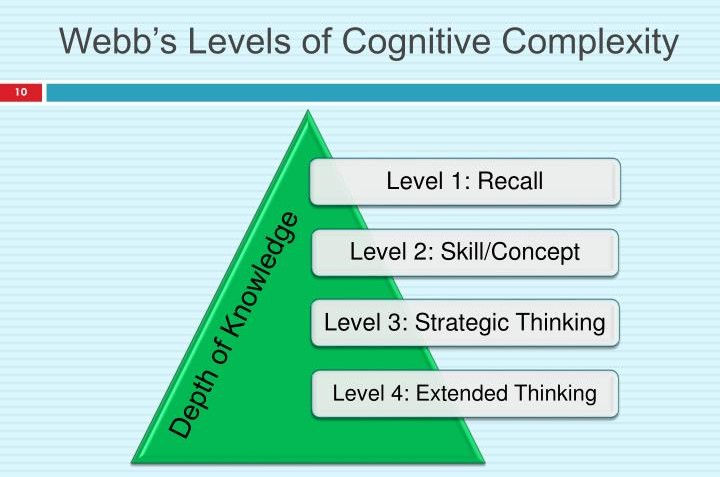Cultivating Minds: Webb's Depth of Knowledge in Education - Levels, Strategies, & Benefits
- Akriti Verma
- Aug 8, 2023
- 3 min read
An Overview of Webb's Profound Knowledge
Webb's Depth of Knowledge is a framework for classifying duties according to the level of mental complexity required. Four levels, each representing a distinct level of cognitive expectation or depth of knowledge required to complete a task, were developed by Dr. Norman Webb.
Four Depth of Knowledge Levels
Level 1: Recall and Reproduction
This level focuses on the simple recall of facts, terms, and procedures. Information is expected to be memorized and repeated by students.
Teachers can employ memorization techniques such as assessments and flashcards in the classroom. In addition, simple mathematical calculations fell under this category.
Level 2: Abilities and Ideas
Students are expected to make decisions about how to approach a query or problem in this section. It involves more than simple recall and requires a comprehension of the relationships between concepts.
Implementation in Schools: Group discussions, guided practice, and data or text interpretation are typical at this level. Students may compare two literary characters or explain how a scientific process operates.
Level 3: Strategic Thinking
This level of comprehension requires higher-order thinking, such as reasoning, planning, and utilizing evidence. Students must consider critically and articulate their reasoning.
Implementation in Schools: Case studies, collaborative projects, and open-ended queries encourage students to analyze, evaluate, and synthesize data.
Level 4: Extended Reflection
This level of comprehension requires complex reasoning, planning, and extended thought. Students must synthesize information from multiple sources and may even design and undertake their own investigations.
Implementation in Schools: This category includes long-term initiatives, research papers, and developing and testing hypotheses. Throughout the course of a community service project, students may employ multiple skills.
Understanding these benefits can motivate educators to integrate the DoK framework into their curriculum and teaching strategies, resulting in more dynamic and influential learning experiences.
1. Enhanced Curriculum Design:
In-Depth Understanding Using the DoK framework, educators are able to design a curriculum that incorporates varying levels of cognitive complexity. This ensures that students not only memorize data, but also develop a conceptual understanding and critical thinking abilities.
Sequential Progression Teachers are able to guide students through a logical and sequential progression by aligning tasks and activities with various DoK levels. This approach helps students develop their knowledge and abilities gradually.
Flexible Implementation: Educators are able to adapt their curricula to meet the varying requirements of their students. By determining where students are on the DoK scale, teachers can provide individualized assistance to help each student advance.
2.Enhancing Critical Thinking and Analytical Abilities:
Analytical Skills: The ability to evaluate, synthesize, and apply knowledge is fostered by encouraging students to engage with higher levels of Depth of Knowledge (DoK).
Encourages Creativity: Teachers stimulate curiosity and originality by posing difficult queries and assignments. Students learn to think creatively and approach problems from various perspectives.
Prepares Students for Real-World Challenges Critical thinking is essential in many real-world situations. Integrating the DoK framework prepares pupils to deal with complex problems outside of the classroom.
3. Individualized Instructional Opportunities:
Individualized Instruction: Recognizing where students are within the DoK levels enables educators to provide individualized instruction that meets students where they are and helps them advance.
Supports Diverse Learning Needs Students acquire knowledge at variable rates and comprehension levels. The DoK framework provides educators with a structure for recognizing and responding to these distinctions.
Facilitates Growth and Achievement: By providing targeted support, teachers can assist students in overcoming obstacles and achieving personal development, thereby enhancing overall classroom performance.
4. Harmonized Assessment Procedures:
Reflects the Right Understanding: Assessments designed with DoK levels in mind ensure that they measure a student's true comprehension of a subject, as opposed to merely their ability to recall facts.
Increases Effectiveness of Assessments Educators can create more pertinent and efficient assessments by aligning them with the cognitive rigor of their lessons.
Supports Continuous Improvement Supports Through aligned assessments, teachers can identify areas of strength and vulnerability in their own teaching practices as well as their students' comprehension. This feedback mechanism encourages continuous progress.
Webb's Depth of Knowledge is a multifaceted resource that enhances the teaching and learning process. The DoK framework provides a comprehensive approach to education, including curriculum design, cultivating critical thinking, individualizing instruction, and developing aligned assessments.

By embracing the complexities of DoK, educators can create a more engaging and rewarding classroom environment, thereby fostering not only academic achievement but also personal development and preparedness for the real world. Implementing these principles with care can lead to a transformation in how students engage with their education, making the voyage of learning more vibrant and meaningful.





Comments